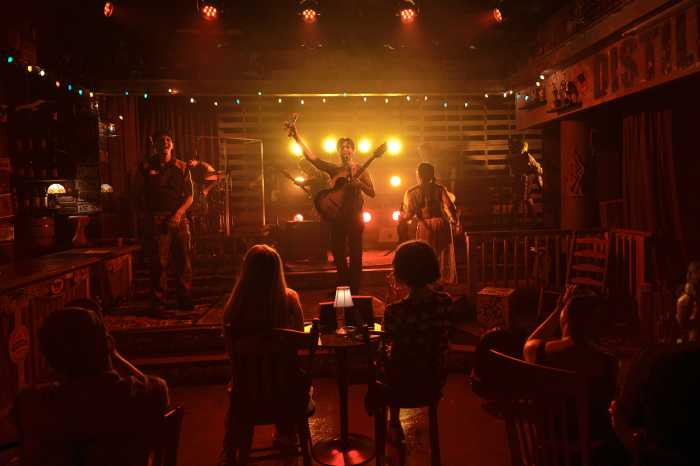David Barlow and Alex Draper in Caryl Churchill’s “Serious Money.” | STAN BAROUH
“Serious Money,” Caryl Churchill’s fierce satire about the newly minted greed in the financial houses of Margaret Thatcher’s London, is one of the most unsettling comedies you’re likely to see this summer. And one of the most strenuous.
Although the play, first staged in London in 1987, features Dr. Seuss-like rhyming couplets and raucous song-and-dance routines poking fun at the foibles of the Masters of the Universe who get filthy rich on the backs of others, “Serious Money” is no frothy period piece.
In fact, the underlying factors that propelled these money-grubbing fiends — financial deregulation, high-tech advances, sketchy or illegal speculative practices (insider trading, anyone?), inflated egos, insatiable hunger for power, and, of course, moral bankruptcy — are all too real today.
It’s a safe bet all that got us into our current economic mess.
But be forewarned, if you’re one of those people who first reads the Arts & Leisure section of the Sunday paper and rarely gets around to Business, you’re in for a bit of a slog. This world of hedge funds, leveraged buyouts, junk bonds, white knights, and greenmail is not for everyone.
The plot, which jumps around like a floor trader on a champagne-and-cocaine binge, is tough to follow. Plucky Scilla (well-played by Tara Giordano) is a trader at LIFFE (London International Financial Futures Exchange) who will stop at nothing to seal the biggest business deals. Her brother Jake (Mat Nakitare) is being investigated by the authorities for dirty dealings with an American arbitrageur (Megan Byrne) and ends up dead. It’s up to Scilla to find out how he died and, more importantly, where his loot is.
There’s also a subplot that finds the suave Zac Zackerman (David Barlow), an American banker, and Billy Corman (Alex Draper), an oily corporate raider, with their sights set on a company called Albion. A whirl of wheeler-dealings and double-crossings ensues.
Director Cheryl Faraone, staging the action at a breakneck pace, does her darnedest to clarify this madness.
The foreign setting only adds to the challenge. If you know what a “Big Bang” (the deregulation of the British financial markets), a “Sloane Ranger” (England’s version of a Yuppie), or an “oik” (an undereducated, lower-class trader) is, you’re ahead of the game. The glossary of terms in the printed program is of limited use.
This might explain why the play was a hit in London but flopped on Broadway in a 1988 production.
Not that there aren’t pleasures to be found. Faraone’s staging is wildly inventive, the principal turns are surprisingly strong, and it’s fun to relive relics from a bygone era, like telephones with cords, Filofax diaries, and tacky ‘80s power outfits. And who can resist a lewd conga line, where the traders bump and grind, chanting “4! 5! Sell! Quick! Prick! Yes! No! Cunt!”?
Churchill’s aggressive language matches the explosive energy of the trading floor. Yet while the play effectively captures the excesses of finance, it registers as a bit excessive for cogent theater. The energetic company of 15, playing multiple roles and delivering overlapping dialogue, can make your head spin.
“Man is a gambling animal,” a banker says to justify his behavior. “One makes money from other people’s disasters,” observes Jake. Scilla’s assessment of trading –– that it’s “like playing a cross between roulette and Space Invaders” –– might easily be applied to this production.
Appropriately enough, the soundtrack features choices like the Pet Shop Boys hit “Opportunities (Let’s Make Lots of Money).”
Make no mistake, “Serious Money,” presented by the Potomac Theatre Project (running in repertory with another play about hubris, “Monster”), is a chilling, cautionary tale.
As if recent headlines of banking misdeeds aren’t enough to validate this piece’s prophetic powers, consider an anonymous online survey of 500 financial bigwigs in the US and UK released the day it opened this week. Roughly 25 percent admitted that it’s necessary to engage in unethical or illegal practices to succeed. A similar proportion said they had firsthand knowledge of actual misconduct. I suspect the other 75 percent of respondents were lying.
SERIOUS MONEY | Potomac Theatre Project | Atlantic Stage 2 | 330 W. 16th St. | Jul. 12, 20, 22, 24-25 & 28 at 7:30 p.m.; Jul. 14-15, 21 & 29 at 2:30 p.m. | $15-25 at ticketcentral.com



































